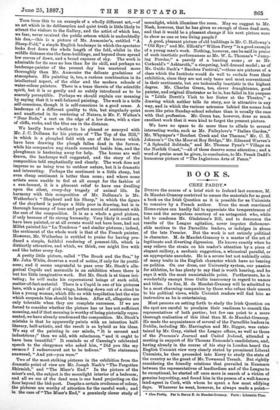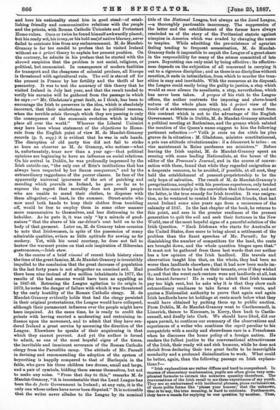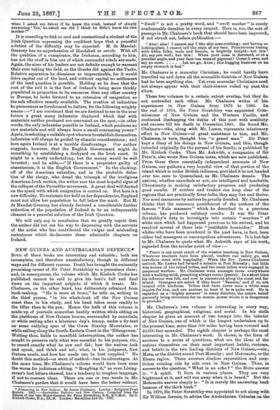BOOKS.
CHEZ PADDY.*
DIMING the course of a brief visit to Ireland last summer, M. de Mandat.Grancey contrived to amass the materials for as good a book on the Irish Question as it is possible for us Unionists to conceive by a French author. Even the most convinced Home-rulers can hardly fail to appreciate the temperateness of tone and the scrupulous courtesy of an antagonist who, while led to condemn Mr. Gladstone's Bill, and to denounce the ranilts of the League agitation, never imputes dishonour- able motives to the Parnellite leaders, or indulges in abuse of the late Premier. But the work is not entirely political in character. M. de Mandat-Grancey is a master of the art of legitimate and diverting digression. He knows exactly when he may relieve the strain on his reader's attention by a piece of elegant raillery, a sardonic suggestion, a whimsical parallel, or an appropriate anecdote. He is a severe but not unkindly critic of many traits in the English character which have no bearing on politics. On our dress, our University system, our passion for athletics, he has plenty to say that is worth hearing, and he says it with the most unmistakable point. Furthermore, he is wonderfully exempt from Gallic inaccuracy in regard to names and titles. In fine, M. its Mandat-Granoey will be admitted to be a most charming companion by those who refuse their assent to his political views, while Unionist readers will find him as instructive as he is entertaining.
Most persons on setting forth to study the Irish Question on the spot are careful to proclaim their readiness to consult the representatives of both parties; but few can point to a more thorough realisation of this ideal than M. de Mandat-Grancey. He made the acquaintance of several of the Parnellite leaders in Dublin, including Mr. Harrington and Mr. Biggar, was enter- tained by Mn. Gray, visited the League offices, as well as theme of the Preeinan'e Journal and United Ireland, attended a meeting in support of Sir Thomas Esmonde's candidature, and, having already in the course of his stay in London heard the English Unionist view very clearly stated by prominent Liberal Unionists, he then proceeded into Kerry to study the state of the country as the guest of Mr. Townsend Trench. But rightly considering the friendly relations that prevailed in Kenmare between the representatives of landlordism and of the League to be exceptional, he started of once more in search of a victim of genuine boycotting, and found him in the person of a well-known land-agent in Cork, with whom he spent a few most edifying days. Wherever he went, however, he always made a point-
• Ms Paddy. Paris Baron B. de MandatAranoey. Path : Lilnearie Plea. and here his nationality stood him in good stead—of estab- lishing friendly and communicative relations with the people and the priests, with Roman Catholic Unionists and Protestant Home-rulers. Once or twice he found himself awkwardly placed; but his ready wit, his irony, or his bold use:of native blarney, never failed to extricate him from any embarrassment. M. de Mandel- Chancey is far too candid to profess that he visited Ireland without an a priori theory to explain her present position. On the contrary, he admits in his preface that he started with the shrewd suspicion that the problem is not social, religious, or political, but economical. In consequence of modern facilities for transport and the cheapness of colonial produce, all Europe is threatened with agrimiltural ruin. The evil is staved off for the present in France by her fertility and the thrift of her peasantry. It was to test the accuracy of this theory that he visited Ireland in July last year, and that the result tended to verify his surmise will be gathered from the passage in which he says :—" Mr. Gladstone's great fault, as I think, has been to encourage the Irish to persevere in the idea, which is absolutely incorrect, that their misfortunes are due to political reasons, when the terrible crisis through which they are passing is only the consequence of the economic evolution which is taking place all over the world." Whoever the Liberal Unionist may have been whose statement of the objections to Home- rule from the English point of view M. de Mandat-Grancey .records (p. 9, seqq.) it is evident that he was in safe hands. The disruption of old party ties did not fail to strike so keen an observer as M. de Grancey, who notices—what is, unfortunately, truer now than a year ago—that political opinions are beginning to have an influence on social relations. On his arrival in Dublin, be was profoundly impressed by the Irish outside-car, "the only one of Erin's institutions that has always been respected by her Saxon conquerors," and by the extraordinary raggedness of the poorer classes. In face of the apparently universal ignorance of the art of patching and mending which prevails in Ireland, he goes so far as to express the regret that morality does not permit people who are unable to mend their clothes, to dispense with them altogether,—at least, in the summer. Street-arabs who now need both bands to keep their clothes from tumbling off, would be free to employ them in some other manner more remunerative to themselves, and less distressing to the beholder. As he puts it, it was only "by a miracle of good- mature" that the sleeve of his car-driver's coat held on to the body of that garment. Later on, M. de Grancey takes occasion to note that Irishwomen, in spite of the possession of many admirable qualities, evince as little aptitude for sewing as for cookery. Yet, with his usual courtesy, he does not fail to bestow the warmest praise on that sole inspiration of Hibernian gastronomes,—Irish stew.
In the course of a brief résumé of recent Irish history since the time of the great famine, M. de Mandat-Grancey is irresistibly impelled to the conclusion that the great decrease of population in the last forty years is not altogether an unmixed evil. Had there been nine instead of five million inhabitants in 1877, the results of the bad seasons would have been as appalling as in 1847-48. Retracing the League agitation to its origin in 1879, he notes the danger of failure with which it was threatened by the early hostility of the Roman Catholic clergy. M. de Mandat-Grancey evidently holds that had the clergy persisted in their original protestations, the League would have collapsed, although their paramount influence over the people might have been impaired. At the same time, he is ready to credit the priests with having exerted a moderating and restraining in- fluence upon the movement, and to admit that they have ren- dered Ireland a great service by assuming the direction of the League. Elsewhere he speaks of their acquiescing in that which they cannot prevent. And yet the author is forced to admit, as one of the most hopeful signs of the times, the inevitable and imminent severance of the Roman Catholic clergy from the Parnellite camp. The attitude of Mr. Parnell in devising endrecommending the adoption of the system of boycotting is happily compared to that of Harlequin in the fable, who gave his three children two drums, small and large, and a pair of cymbals, bidding them amuse themselves, but not to make any noise. "From that day to this," remarks M. de Mandat Grancey, "it is incontestable that the Land League has been the de facto Government in Ireland ; at any rate, it is the only one whose orders have never been disputed." It is noticeable that the writer never alludes to the League by its nominal title of the National League, but always as the Land League, —a thoroughly pardonable inaccuracy. The suppression of the latter and the establishment of the former have always reminded us of the story of the Puritanical statute against ninepins in America which was evaded by changing the name to tenpins. While admitting the pre-existence of agrarian feeling tending to frequent assassination, M. de Mandat- Grancey finds it impossible to acquit the League of a great share in the responsibility for many of the crimes committed of late years. Boycotting can only exist by being effective : its effective- ness depends on the subjection of all concerned in carrying it out to a rigorous discipline; and as there is no discipline without sanction, it ends in intimidation, from which to murder the tran- sition is easy and inevitable. With the resources at its disposal, the League could easily bring the guilty to justice, a step which would at once silence its assailants, a step, nevertheless, which has never been taken. .1 proper of his visit to the League offices, the author contrasts the imposing and above-board nature of the whole place with his in priori view of the locale of in subterranean conspiracy, and draws a moral from this contrast which is not to the advantage of the English Government. While in Dublin, M. de Mandat-Grancey attended a political meeting at Rathmines, and the groans which saluted the mention of the Queen's name suggest to him the following pertinent reflection :—" Voilk is crois on des cotis les phis graves de la situation: M. Gladstone, ministre constitutionnel, a pris une attitude r6volutionnaire : il a deconvert le tame on vise maintenant la Reine pardessus see ministres." Before leaving the Irish capital, M. de Mandat-Grancey spent an evening with some leading Nationalists, at the house of the editor of the Freeman's Journal, and in the course of conver- sation with them, found that while they regarded emigration as a desperate resource, to be avoided, if possible, at all cost, they held the establishment of peasant-proprietorship to be the only hope of salvation. The result of M. de Mandat-Grancey's peregrinations, coupled with his previous experience, only tended to root him more firmly in the conviction that the former, and not the latter, is the true remedy for Irish troubles. It was emigra- tion, as he ventured to remind his Nationalist friends, that had saved Ireland some nine years ago from a recurrence of the calamity of 1847. In the last chapter of the book, he returns to this point, and sees in the greater readiness of the present generation to quit the soil and seek their fortunes in the New World, one of the most hopeful signs of a peaceful solution of the Irish Question. "Each Irishman who starts for Australia or the United States, does more to bring about a settlement of the problem than the finest speeches of Mr. Parnell; for by diminishing the number of competitors for the land, the rents are brought down, and the whole question hinges upon that." It must not be gathered from these last words that our author has a low opinion of the Irish landlord. His travels and observation taught him that, on the whole, they had been no worse than landlords elsewhere ; that it had now been made im- possible for them to be hard on their tenants, even if they wished it; and that the worst rack-renters were not landlords at all, but the tenant-farmers ! He is ready to admit that Irish tenants pay too high rent, but he asks why it is that they show such extraordinary readiness to take farms at these rents, and quotes a Nationalist authority to prove that again and again Irish landlords have let holdings at rents much below what they would have obtained by putting them up to public auction. From Dublin, M. de Mandat-Grancey went to Castleconnell, in Limerick, thence to Kenmare, in Kerry, then back to Castle- connell, and finally into Cork. We should have liked, did our space permit, to continue our summary of the observations and experiences of a writer who combines the esprit peculiar to his compatriots with a sanity and shrewdness rare in a Frenchman when he discusses the home poliey of a foreign nation. He renders the fullest justice to the conversational attractiveness of the Irish, their ready wit and rich humour, while he does not shrink from declaring their two great faults to be incorrigible mendacity and a profound disinclination to work. What could be better, again, than the following passage on Irish explana- tions7— Irish explanations are rather diffuse and hard to comprehend. In courses of elementary mathematics, pupils are often given very cote. plioated formuhe to extract the unknown quantity therefrom. The conversations of the Irish recall to me these experiences of my youth. They are so embarrassed with incidental phrases, pious exclamations, of mere polite forms like please your honour,' that the unknown, that is to say, the true meaning, is hard to extricate. Furthermore, they have a mania for replying to one question by another. Thom,
when I asked my driver if he knew the road, instead of simply answering' Yee,' he asked me did I think he didn't know his own mother!"
It is consoling to find co cool and unemotional a student of the Irish- Question expressing the confident hope that a peaceful ablution of the difficulty may be expected. M. de Mandat- Grancey has no apprehension of bloodshed or revolt. With all the qualities of a conspirator, the Irishman, according to him, has not the stuff in him out of which successful rebels are made. Again, the aims of his leaders are not definite enough to warrant their ever taking the field, as the Greeks did against the Turks. Relative separation he dismisses as impracticable, for it would drive capital out of the land, and without capital no settlement of the laud question is possible. Holding as he does that the root of the evil is in the fact of Ireland's being more thickly populated in proportion to its resources than any other country in Europe, he looks forward to an extension of emigration as the sole effective remedy available. The creation of industries he pronounces as foredoomed to failure, for the following weighty reason :—" I am convinced that we are destined to see in the near future a great many industries displaced which deal with materials neither produced nor consumed on the spot—in other words, the only industries possible in Ireland, which produces no raw materials and will always have a small consuming power." Again, in selecting a suitable spot whereon to establish themselves, industries will always be guided by climatic considerations ; and here again Ireland is at a terrible disadvantage Oar author suggests, however, that the English Government might do something by establishing a dockyard on the Irish coast. It might be a costly undertaking, but the money would be well invested ; and he adds,—" If there is a proprietor guilty of absenteeism, it is the English Government." In the slacking. off of the American subsidies, and in the probable defec- tion of the clergy, who dread the triumph of the irreligious Americandrish section, the writer sees the most hopeful signs of the collapse of the Parnellite movement A great deal will depend on the speed with which emigration is carried on. But here is a new difficulty. To maintain her hold on her dependencies, England must not allow her population to fall below the mark. But M. Is Mandat.Grancey has already declared a considerable further reduction of the population of Ireland to be an indispensable element in a peaceful solution of the Irish Question.
We will only say in conclusion that we greatly regret that the author did not see hie way to dispensing with the services of the artist who has contributed the vulgar and misleading caricatures which de-decorate these admirable chapters on Ireland.




































 Previous page
Previous page